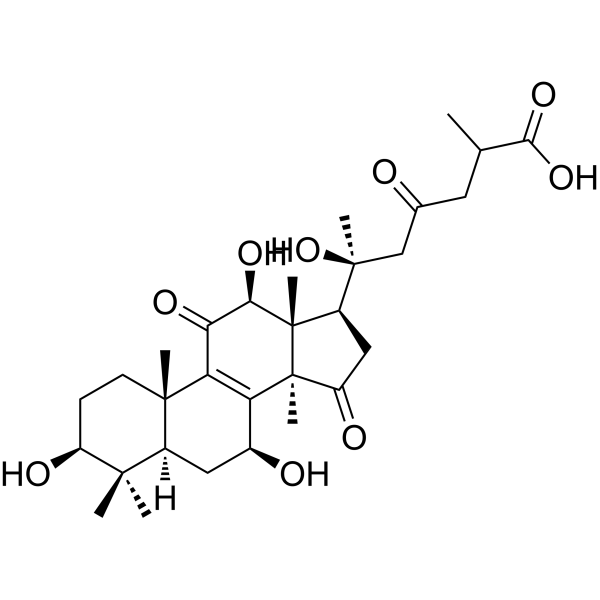
20-Hydroxyganoderic acid G
CAS No. 400604-12-8
20-Hydroxyganoderic acid G( —— )
Catalog No. M31723 CAS No. 400604-12-8
20-Hydroxyganoderic acid G is a lanosterane triterpenoid obtained from the ethanolic extract of Ganoderma curtisii (Ganoderma curtisii) cotyledons.
Purity : >98% (HPLC)
 COA
COA
 Datasheet
Datasheet
 HNMR
HNMR
 HPLC
HPLC
 MSDS
MSDS
 Handing Instructions
Handing Instructions
| Size | Price / USD | Stock | Quantity |
| 5MG | 383 | In Stock |


|
| 50MG | Get Quote | In Stock |


|
| 100MG | Get Quote | In Stock |


|
Biological Information
-
Product Name20-Hydroxyganoderic acid G
-
NoteResearch use only, not for human use.
-
Brief Description20-Hydroxyganoderic acid G is a lanosterane triterpenoid obtained from the ethanolic extract of Ganoderma curtisii (Ganoderma curtisii) cotyledons.
-
Description20-Hydroxyganoderic acid G is a lanosterane triterpenoid obtained from the ethanolic extract of Ganoderma curtisii (Ganoderma curtisii) cotyledons. 20-Hydroxyganoderic Acid G inhibited LPS-activated BV-2 microglia, with an IC50 value of 21.33 μM. 20-Hydroxyganoderic Acid G was used to study neuroinflammatory diseases associated with LPS activation. 20-Hydroxyganoderic Acid G was used to study neuroinflammatory diseases associated with microglia activated by LPS.
-
In Vitro——
-
In Vivo——
-
Synonyms——
-
PathwayOthers
-
TargetOther Targets
-
Recptor——
-
Research Area——
-
Indication——
Chemical Information
-
CAS Number400604-12-8
-
Formula Weight548.67
-
Molecular FormulaC30H44O9
-
Purity>98% (HPLC)
-
Solubility——
-
SMILES——
-
Chemical Name——
Shipping & Storage Information
-
Storage(-20℃)
-
ShippingWith Ice Pack
-
Stability≥ 2 years
Reference
molnova catalog



related products
-
Sulbactum Sodium
Sulbactum Sodium is synthesized from cytidine monophosphate (CMP) or uridine monophosphate (UMP) by the transfer of phosphoryl group, catalyzed by the enzyme uridylate kinase (UMPK).
-
7-Amino-4-methylcoum...
7-Amino-4-methylcoumarin is more suitable as a substrate for enteropeptidase than GD(4)K-NA.
-
6"-O-Apiosyl-5-O-Met...
6”-O-Apiosyl-5-O-Methylvisammioside is one component of the traditional Chinese medicine Kang-Jing which has the functions of promoting blood circulation and dredging collaterals, dispersing wind and relieving pain.



 Cart
Cart
 sales@molnova.com
sales@molnova.com


